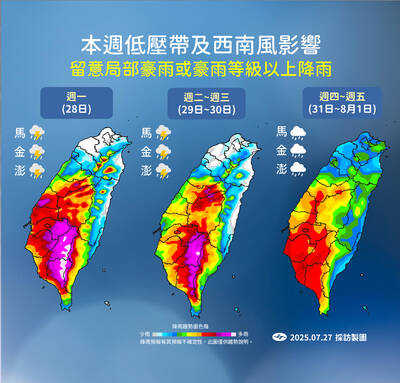Aboriginal rights activists slammed President Ma Ying-jeou (馬英九) over his Aboriginal policies at a forum yesterday and expressed concern about Aboriginal autonomy.
“I would describe Ma’s Aboriginal policy with the following words: ignorant, heartless, incapable and powerless,” Obay a Awai, an Saisiat autonomy activist, told a forum held by the Democratic Progressive Party (DPP) on Aboriginal policy under the Chinese Nationalist Party (KMT) government.
“[Ma’s government] is ignorant because it intentionally disregards the global trend for indigenous peoples to seek self-determination and autonomy; it’s heartless because the only focus of its Aboriginal policy is providing welfare to the poor; it’s incapable of initiating dialogues based on Aboriginal self-identity; and it’s powerless because it cannot bring anything new, and all its policies look good from the outside but are empty inside,” Obay said.
Other speakers agreed and expressed concerns over the future of Aboriginal autonomy — an objective that activists have fought for in recent decades.
“Eight years ago, former president Chen Shui-bian [陳水扁] signed a ‘new partnership treaty’ with Aborigines, declaring that Aborigines could enter into dialogue with the government on an equal footing and advocate Aboriginal autonomy,” said Upay Kanasaw, an Aboriginal health professor at Tzu Chi University.
However, it caused Upay serious concern that Ma’s government seemed to be deviating from this path. He said that during the presidential campaign, Ma promised to put into practice Aboriginal autonomy “on a trial basis.”
“I’m worried that the ‘trial’ — without legal basis — will become a permanent trial and eventually die away,” he said.
Busin Dali, director of the Taiwan Theological College and Seminary, said that he had lost all confidence in Ma’s Aboriginal policy and that “in his concept, Aborigines are merely minorities in the pan-Chinese family.”
Speakers also criticized the government for suspending an Aboriginal diplomacy plan.
The DPP administration tried to enhance relations with countries in the Asia-Pacific region by establishing an Austronesian Forum, since Taiwanese Aborigines and Austronesian peoples share a common cultural heritage.
Icyang Parod, former minister of the Council of Indigenous Peoples (CIP), said the council last year listed a NT$15 million (US$467,000) budget for the Austronesian Forum, “but the CIP under the new minister listed nothing at all for it.”
As a result, he said, Taiwan has not paid rent on the Austronesian Forum headquarters in Palau for several months.
“The government is downgrading Aboriginal autonomy, it’s suspending international exchanges between Taiwanese Aborigines and indigenous peoples in other countries, and it’s trying to buy off Aborigines with welfare offers,” Obay said.
“Ma is working to cut off Aborigines’ opportunities to stand up on our own,” he said.

The Central Weather Administration (CWA) today issued a "tsunami watch" alert after a magnitude 8.7 earthquake struck off the Kamchatka Peninsula in northeastern Russia earlier in the morning. The quake struck off the east coast of the Kamchatka Peninsula at 7:25am (Taiwan time) at a depth of about 19km, the CWA said, citing figures from the Pacific Tsunami Warning Center. The CWA's Seismological Center said preliminary assessments indicate that a tsunami could reach Taiwan's coastal areas by 1:18pm today. The CWA urged residents along the coast to stay alert and take necessary precautions as waves as high as 1m could hit the southeastern

The National Museum of Taiwan Literature is next month to hold an exhibition in Osaka, Japan, showcasing the rich and unique history of Taiwanese folklore and literature. The exhibition, which is to run from Aug. 10 to Aug. 20 at the city’s Central Public Hall, is part of the “We Taiwan” at Expo 2025 series, highlighting Taiwan’s cultural ties with the international community, National Museum of Taiwan Literature director Chen Ying-fang (陳瑩芳) said. Folklore and literature, among Taiwan’s richest cultural heritages, naturally deserve a central place in the global dialogue, Chen said. Taiwan’s folklore would be immediately apparent at the entrance of the

Speeding and badly maintained roads were the main causes of a school bus accident on a rainy day in Taipei last year that severely injured two people and left 22 with minor injuries, the Taiwan Transportation and Safety Board said. On March 11 last year, a Kang Chiao International School bus overturned inside the Wenshan Tunnel (文山隧道) on the northbound lane of the Xinyi Expressway. The tour bus, owned by Long Lai Co, exceeded the speed limit after entering the tunnel, the board’s investigation found. Sensing that the rear of the vehicle was swaying, the driver attempted to use the service and exhaust

Central and southern Taiwan are to see increasingly heavy rainfall from last night through Friday due to the effects of a low-pressure system and southwesterly winds, the Central Weather Administration (CWA) said. CWA forecaster Liu Pei-teng (劉沛滕) said Tropical Storm Co-May had weakened into a low-pressure system on Saturday, but that it strengthened again into a tropical depression (TD 11) near the seas around Japan's Ryukyu Islands due to favorable environmental conditions. The tropical depression is expected to persist for two to three days, moving west-northwest by this afternoon and reaching China's Zhejiang through the East China Sea tomorrow,